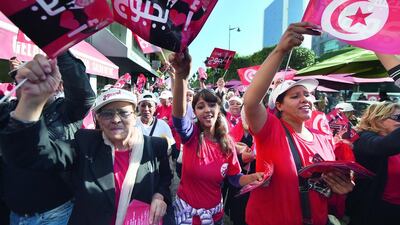Eileen Byrne and Chris Stephen
Tunisian politicians have shown a willingness to bury the hatchet, whereas two successive elections have failed to bring stability to Libya.
A long line of cars was backed up in the November sun at the Ras Ajdir border crossing on the Mediterranean coast road. The main crossing between Libya and Tunisia, it had been closed for the previous three days by the Tunisians, anxious to avoid any upset during the first presidential election since their 2011 revolution. The Libyan travellers would wait hours to get into the country that since their own uprising has represented, comparatively, a haven of stability. Only a couple of Libyan ambulances heading for Tunisian hospitals – most likely carrying casualties from recent fighting – were given fast-track treatment.
As 2014 drew to a close, the Tunisian authorities were taking no chances: Libya’s slide towards further instability must not spill over and threaten the political process in its neighbour.
During 2014, Tunisia won plaudits from the international community for progress in building a functioning democracy. In January a new constitution was endorsed by both the Islamist party Ennahda and the opposition in the constituent assembly. After the sharp polarisation of 2013 – when the assassination of two opposition politicians had led to calls for this elected assembly to be dissolved – late January saw a peaceful handover by the Islamist-led coalition government to a temporary administration headed by a non-party figure, Mehdi Jomaa. The year concluded with elections for a new assembly and a president.
See all our Year in Review coverage
The road ahead is not without hazards, however. Any overspill of the Libyan conflict – a worst-case scenario – would strain Tunisia’s security forces, already overstretched as they confront small armed Islamist groups along the western border with Algeria.
The flow of young Tunisians to the war in Syria and Iraq hit the headlines in 2014. By the end of the year, however, the authorities were claiming that the phenomenon was largely over, and that only four mosques nationwide remained under Salafist control. In provincial towns, where fresh job-generating investment has been largely absent, youth unemployment still fuels discontent.
The autumn elections exposed a stark geographical divide. In the poorer, more conservative south, support for Ennahda translated into a vote for incumbent president Moncef Marzouki, a former dissident, as he stood for re-election. The north favoured veteran politician Beji Caid Essebsi and his secularist Nidaa Tounes party, with its old-regime links. However Tunisian politicians have so far shown a willingness eventually to make the necessary compromises “for the sake of the nation”. In the new year Nidaa Tounes, which has the largest bloc in the new parliament, will be under pressure to make its new government an inclusive one.
Libyans for their part see a highly uncertain future as the new year approaches. For them, 2014 was the year when a simmering conflict between armed Islamist groups and tribal forces exploded into open war. Two elections since the overthrow of Muammar Qaddafi in August 2011 have failed to bring stability, with tribal, regional, Islamist, jihadist and criminal groups jostling for power in a country awash with weapons.
In March, rogue army units blockading eastern ports tried to sell oil, independently of the government, aboard a North Korea-registered tanker. American commandos boarded the ship off Cyprus, returning it to Libya, but the episode highlighted the country's ungovernability. The trigger for a further meltdown was the legislative election in June, which created a Council of Representatives to replace the General National Congress legislature, elected almost two years earlier.
Islamists suffered sharp reverses in the June election, winning only about 30 of the 188 contested seats. In July, Islamist militias joined those from Misurata and other western coastal towns to form the Libya Dawn militia force. They staged an armed uprising in Tripoli and repudiated the new Council of Representatives, declaring it to be dominated by Qaddafi followers. The uprising polarised Libya’s many factions, most of them gathering around either the elected parliament, which fled to Tobruk, or Libya Dawn’s own self-declared government, the National Salvation Front, in Tripoli.
Foreign embassies and the UN fled the capital, and by September the country was in a state of civil war. Islamist-led rebels were holding three key cities, Tripoli, Benghazi and Misurata. The Council of Representatives met in a Tobruk hotel, while a rented Greek liner moored in the harbour provided extra accommodation.
The military balance began to shift, with the Tobruk government, in control of oil revenues, building its army and air force. Air strikes pushed Islamist forces back into small pockets in Benghazi. By November, bombers had begun hitting Libya Dawn targets around Tripoli, including at its remaining airport, Mitiga.
The bombing threw Libya Dawn on to the defensive along a front line south of Tripoli. UN special envoy Bernadino Leon continued to offer mediation, but was confounded by the irreconcilable demands of the two groups: Libya Dawn demanded power-sharing as the price for peace, while the Council of Representatives parliament in Tobruk insisted it be the sole governing body.
Many Libyans will begin 2015 wondering how a country with Africa’s largest oil reserves and an apparently bright future after it overthrew Qaddafi could have descended into such chaos. Tunisians, meanwhile, uncomfortably aware of the turbulent regional context, are hoping that the war next door does not jeopardise their own fledgling democracy.
Eileen Byrne is a freelance journalist based in Tunis and Chris Stephen is the freelance correspondent for The Guardian covering Libya.

